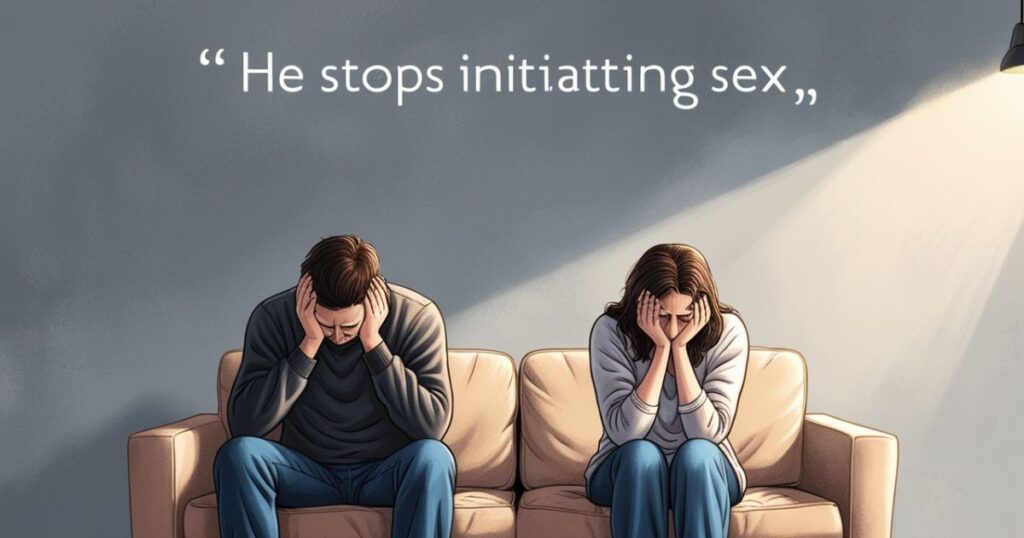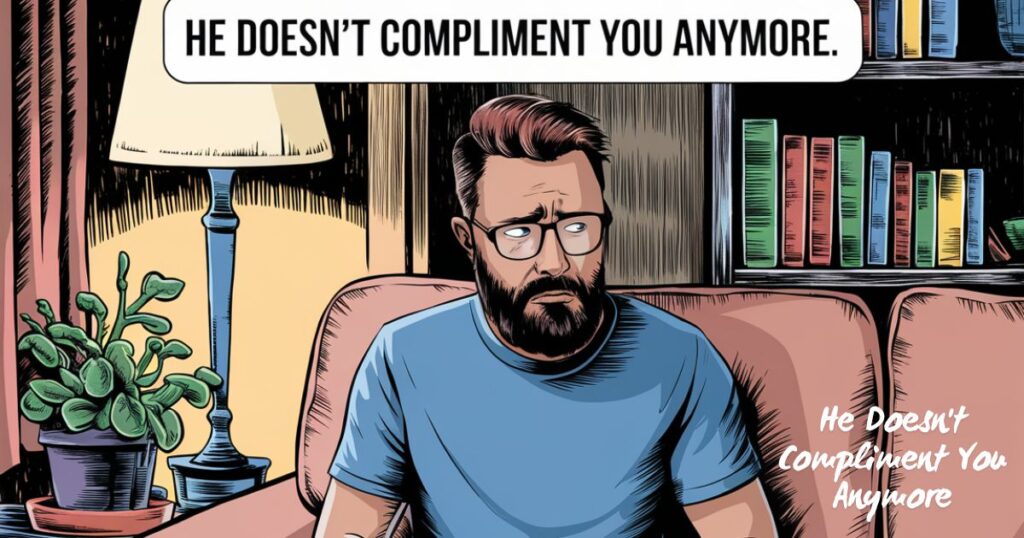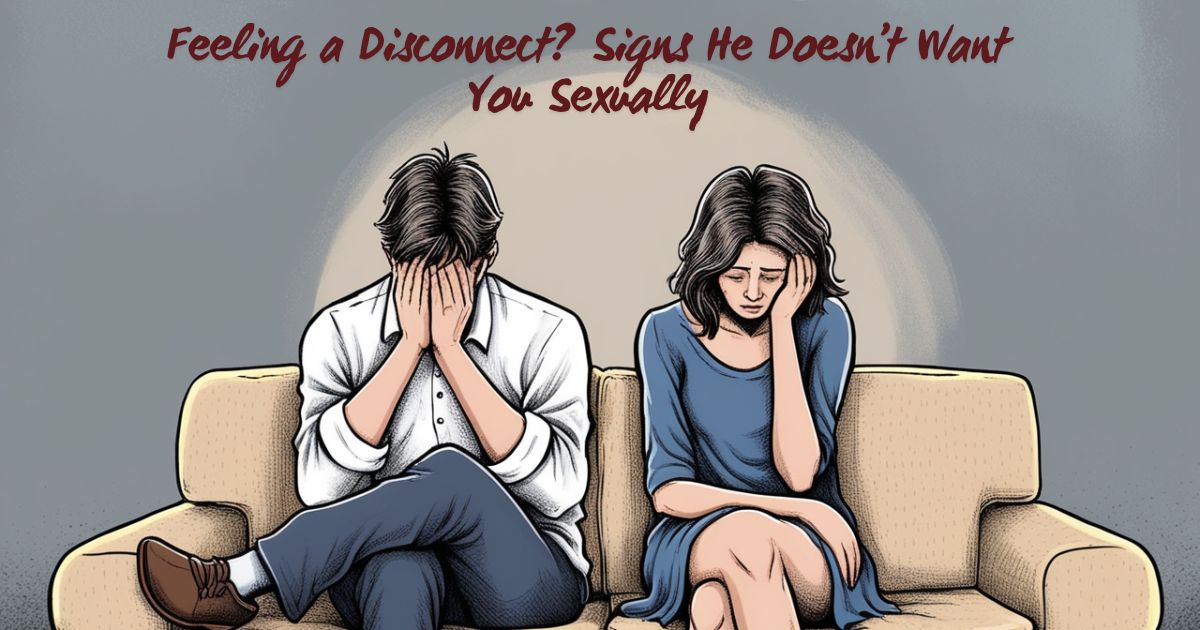That gnawing feeling in the pit of your stomach when something feels off in your relationship can be overwhelming. When it comes to intimacy issues, particularly noticing signs he doesn’t want you sexually, the emotional impact can be devastating. This comprehensive guide will help you understand the subtle (and not-so-subtle) signs of sexual disconnect, while offering practical solutions to bridge the gap in your relationship.
Understanding Sexual Disconnect in Relationships
Loss of intimacy in relationships rarely happens overnight. Like a slowly dimming light, the changes often occur gradually, making them harder to spot until the room is noticeably darker. Sexual disconnect can manifest in various ways, from subtle shifts in body language to obvious changes in behavior.
Some general signs of disconnection include a marked lack of physical affection, frequent disagreements over intimacy, and a noticeable failure to initiate intimacy. When your partner, who was once physically demonstrative and regularly initiated sex, suddenly or gradually stops, it often signals a deeper issue that needs addressing.
The Impact of Sexual Disconnect
Research shows that sexual satisfaction plays a crucial role in relationship health:
| Factor | Impact on Relationship |
| Sexual Satisfaction | 62% higher relationship satisfaction |
| Regular Intimacy | 45% better communication |
| Physical Affection | 58% stronger emotional bond |
| Sexual Disconnect | 73% increased relationship stress |
17 Clear Signs He’s Lost Sexual Interest
1. He Stops Initiating Sex

The most obvious red flag in terms of sexual interest often appears in changed initiation patterns. When your partner suddenly stops being the one to start intimate moments, it’s like a canary in the coal mine of relationship health.
One of the most obvious signs is when he stops initiating sex altogether. If he used to be the one to start things off and now he doesn’t, it could mean he’s lost interest. This shift often indicates underlying issues such as:
- Increased stress levels
- Hormonal changes
- Emotional disconnection
- Relationship dissatisfaction
As you can imagine, when a partner stops initiating sex, it often signals a shift in their emotional or physical state. It might be due to stress, fatigue, or even a deeper issue within the relationship. “Changes in sexual initiation patterns often reflect deeper emotional or physical concerns that need addressing,” notes Dr. Sarah Thompson, relationship expert.
What to Do:
Try to talk to him about it. Approach the conversation gently and ask if there’s something on his mind. Sometimes, stress or other issues can affect his desire. Express your feelings without blaming him. For example, you might say, “I’ve noticed we haven’t been intimate lately, and I’m feeling a bit disconnected. Is there something bothering you?” This opens up a dialogue without making him feel attacked.
2. He Turns Down Sex When You Initiate
Rejection in relationships can be particularly painful when it comes to intimate moments. If your advances are consistently met with excuses or outright rejection, it’s essential to understand that this pattern often signals deeper issues beyond just sexual disinterest. For instance, if you try to initiate sex and he turns away or makes excuses, it’s a clear sign something is off.
His behavior can make you feel rejected and unwanted, and turning away may serve as a defense mechanism or a way to avoid confronting underlying issues. This response could stem from personal insecurities, stress, or dissatisfaction in the relationship.
What to do? Consider initiating intimacy at different times or in different ways, as sometimes changing the routine can help. If the issue persists, a deeper conversation might be necessary. You might say, “I’ve noticed you seem to turn away when I try to be intimate. Is there something you’d like to talk about?” or “I’ve noticed you’re often tired at night. How about we try being intimate in the morning?”
3. He Avoids Physical Affection

Physical touch serves as a fundamental building block of intimate relationships. When your partner starts avoiding casual touches, hugs, or kisses, it often indicates a broader withdrawal from emotional and physical intimacy. This avoidance can manifest in subtle ways, such as:
- Pulling away from casual touches
- Creating physical distance on the couch or in bed
- Avoiding hand-holding or public displays of affection
- Limiting physical contact to necessary interactions
Physical touch is a significant part of intimacy. If he avoids hugging, kissing, or even holding hands, it might suggest he’s not interested in being close to you. Physical affection often indicates emotional closeness; avoiding it can signal a withdrawal from the relationship or personal issues affecting his comfort with touch.
What to Do:
Express how important physical affection is to you. Sometimes, he might not realize how his actions affect you. You could say, “I miss our hugs and kisses. They make me feel loved and connected to you.”
4. He Doesn’t Make Eye Contact
Eye contact during intimate moments creates a powerful connection between partners. It serves as a visual bridge that enhances intimacy and fosters trust. When this connection is maintained, it deepens the emotional bond between you.
However, if one partner avoids looking at the other, it often signals emotional withdrawal. You might recall that he used to make deep eye contact during your previous intimate encounters, but if he now avoids looking at you, it could indicate discomfort, guilt, or emotional distance. This change might suggest that he’s struggling with feelings he’s not ready to share.
The importance of maintaining eye contact extends beyond sexual encounters—it’s a fundamental aspect of human connection and trust-building. If you notice a shift, consider mentioning that eye contact is important to you. You could express, “I feel more connected when we make eye contact. Is there something on your mind?” This approach invites him to share his feelings without pressure, encouraging an open dialogue about any underlying issues.
5. He Changes the Subject When You Talk About Sex
When your partner consistently deflects conversations about intimacy, it’s often a defense mechanism masking deeper issues. This avoidance behavior can manifest in subtle ways, such as:
- Suddenly remembering urgent tasks
- Changing topics to mundane matters
- Making jokes to lighten the mood
- Becoming irritable or defensive
Dr. Lisa Martinez, sex therapist, explains: “Communication issues around sex often indicate discomfort with vulnerability or underlying relationship concerns that need addressing.”
Click For More Information: Thejavasea.me Leaks AIO-TLP: Protecting Your Privacy
6. He Avoids Spending Time Alone with You

The avoidance of one-on-one time often signals a deeper emotional distance. This behavior might include:
- Making plans that always include others
- Working late consistently
- Inviting friends to what used to be date nights
- Creating buffer zones through technology or activities
Case Study:
Sarah noticed her partner Tom always invited friends over for movie nights that used to be their private time. When confronted, Tom admitted feeling pressure about intimacy during alone time, revealing underlying performance anxiety that needed addressing.
7. He’s Always Busy
Chronic busyness can be a shield against intimacy issues. Stress and desire often have an inverse relationship, but constant unavailability might indicate deliberate avoidance. Watch for:
- Excessive overtime at work
- New hobbies that consume evening hours
- Frequent “emergency” situations requiring attention
- Exhaustion as a regular excuse
8. He Doesn’t Flirt with You Anymore
The absence of flirting behavior can signal a decline in romantic interest. Healthy relationships often maintain playful interaction even years into the partnership. Signs of decreased flirtation include:
- No more playful texts during the day
- Lack of compliments about appearance
- Missing your usual inside jokes
- Decreased physical playfulness
9. He Doesn’t Talk About Anything Sexual

When discussions about your sexual relationship disappear entirely, it often indicates discomfort or disconnection. This extends beyond simply avoiding talk about current intimacy issues; it includes:
- No more sharing fantasies
- Avoiding discussions about future intimate plans
- Discomfort with sexual jokes or innuendos
- Changed reactions to romantic movies or scenes
If he used to talk about sexual topics but has stopped, it could indicate a change in his feelings or comfort level. This shift might suggest that he no longer sees you in a sexual light or that something has changed in your relationship dynamics. External factors such as stress, personal issues, or a desire to respect your boundaries may also play a role.
What to Do:
Have an open and honest conversation about your sex life. Sometimes, discussing these matters can help resolve underlying issues. You could say, “I feel like we don’t talk about our sex life anymore. Can we have an open conversation about it?”
10. He Avoids Being Naked Around You
Nudity discomfort often stems from deeper issues than just body image. Changes in comfort with nudity might indicate:
- Decreased trust
- Lowered intimacy comfort levels
- Potential infidelity concerns
- Personal insecurity growth
If he’s suddenly very self-conscious and avoids being naked around you, it might mean he feels less comfortable or less attracted to you in a sexual way. When he is interested in a sexual relationship, he usually feels more at ease with physical intimacy and nudity. So if he avoids these situations, it could mean he’s distancing himself from that kind of connection.
What to Do:
Reassure him that you find him attractive. Sometimes, a little boost in confidence can make a big difference. You might say, “I love your body and find you very attractive. Is there something making you feel uncomfortable?”
11. He Seems Emotionally Distant
Emotional closeness and physical intimacy are deeply interconnected. Signs of emotional distance include:
- Shorter conversations
- Less sharing of personal thoughts
- Decreased interest in your emotional state
- Mechanical responses to your concerns
12. He Goes to Bed at Different Times
Bedtime desynchronization often serves as a subtle avoidance technique. Research shows couples who go to bed together report:
| Activity | Satisfaction Rate |
| Same bedtime | 76% higher intimacy |
| Different bedtime | 43% lower connection |
| Shared bedroom routine | 82% better communication |
13. The Sex You’re Having Feels Different
When engagement during intimacy changes, it often reflects deeper relationship issues. Watch for:
- Decreased eye contact
- Less emotional connection
- Mechanical or rushed interactions
- Reduced foreplay or aftercare
14. He Doesn’t Compliment You Anymore

The absence of verbal affirmation often parallels decreased sexual attraction. Healthy relationships typically maintain:
- Regular compliments
- Expressions of appreciation
- Recognition of efforts
- Acknowledgment of changes
Compliments are a way of showing attraction and appreciation. When they stop, it can mean he’s no longer noticing or valuing your appearance and qualities. This lack of positive feedback can leave you feeling less desired and appreciated, potentially indicating that his feelings have changed or that he’s become emotionally distant.
If you find yourself in this situation, consider complimenting him to see if he reciprocates. Sometimes, people need a reminder to show appreciation. You might say, “I love it when you compliment me. It makes me feel special. I also think you’re amazing.”
15. He’s Partying More
Increased socialization without you might indicate a desire for validation elsewhere. This behavior often includes more time with friends, new social circles, increased alcohol consumption, and late-night outings. Increased partying might be his way of seeking excitement and attention, possibly because he’s feeling disconnected from you.
When he spends more time out socializing, it can mean he’s avoiding intimacy and the responsibilities of the relationship. It might also suggest he’s looking for validation or new connections, which can be a red flag.
What to Do:
Talk to him about his behavior. Let him know that you’re concerned and want to understand what’s going on. You might say, “I’ve noticed you’re partying more lately. Is there something bothering you? I’m here to listen.”
16. He’s Not There During Sex
Physical presence without emotional connection creates a profound sense of feeling unwanted. Signs include minimal eye contact, reduced verbal communication, mechanical movements, and quick completion and departure. If he seems mentally or emotionally absent during sex, it can indicate that he is not fully engaged in the sexual relationship, going through the motions without genuine interest or enthusiasm.
What to Do:
Try to make sex more engaging and fun. Adding a little excitement can help rekindle the connection. You might say, “Let’s try something new in bed. I want to make sure we’re both enjoying ourselves.”
17. Something Just Feels Off

Never ignore your intuition about relationship dynamics. Research shows women’s intuition about relationship issues is accurate 85% of the time. When something just feels off in your relationship, it can be a subtle but telling sign that your partner might not want you sexually. This feeling often stems from a lack of intimacy, reduced physical affection, or noticeable changes in behavior.
If your partner seems distant, avoids physical contact, or shows little enthusiasm during intimate moments, it might indicate a decrease in sexual desire. In such cases, it’s important to talk to him about how you’re feeling. Let him know that you’re concerned and want to understand what’s going on. You might say, “I’ve been feeling like something is off between us. Can we talk about it?”
Click For More Information: VyvyManga: Your Ultimate Platform for Manga Enthusiasts
What You Can Do About It
Open Up the Lines of Communication
One of the most crucial steps you can take is to engage in open communication with your partner. Share your feelings and inquire about his. Often, a candid conversation can resolve numerous issues. Establishing open dialogue fosters trust and understanding, enabling both partners to articulate their needs and concerns effectively.
Cultivate Emotional Connections
Focusing on enhancing your emotional bond can significantly improve your sexual relationship. Spend quality time together, share your feelings, and engage in activities you both enjoy. Building emotional intimacy often paves the way for physical closeness.
See Things from His Perspective

Make an effort to understand his viewpoint. Stress, health challenges, or other circumstances may influence his interest in sex. Gaining insight into his feelings can help you both navigate your path forward. Empathy and understanding are essential for building trust and a deeper connection.
Be a Source of Support
Show your support and understanding by assuring him that you’re there for him and that you want to tackle these challenges together. Your support signifies commitment and strengthens your partnership.
Prioritize Intimacy
Explore ways to foster intimacy beyond the physical. Emotional connections, physical affection, and shared experiences can enhance your relationship. Remember, intimacy encompasses more than just sex; it includes emotional and physical closeness.
Take Care of Yourself
Don’t forget to prioritize your own well-being. Caring for yourself is essential, as it enables you to be more present and supportive in your relationship. Practicing self-care ensures you have the emotional and physical stamina to uplift your partner.
Reignite the Spark
Make an effort to restore the fun and excitement in your relationship. Organize date nights, flirt with one another, and explore new experiences together. A little initiative can go a long way in rekindling the romance, helping to maintain a strong bond.
Maintain a Positive Outlook
Keep a hopeful and positive attitude. Relationships naturally ebb and flow, but with dedication and understanding, you can overcome challenges and emerge stronger. Staying positive fosters resilience and encourages a hopeful perspective.
Consider Professional Guidance
If difficulties persist, think about seeking help from a professional. A therapist or counselor can assist you both in uncovering and addressing the underlying issues in your relationship. Professional support can provide fresh insights and effective strategies for improvement.
Practice Patience
Remember that changes in a relationship often take time. Be patient and give your partner the space to open up and reconnect with you. Demonstrating patience reflects your commitment and understanding, allowing him to feel secure in sharing his feelings.
FAQs
How to know if he’s not sexually attracted to you?
Watch for combinations of physical and emotional withdrawal, decreased initiation of intimacy, and reduced affectionate behavior. Remember that attraction has many components beyond physical appearance.
Why doesn’t he want me sexually anymore?
Common causes include:
- Stress and anxiety
- Hormonal changes
- Relationship issues
- External pressures
- Health concerns
What happens when a woman is sexually deprived in a relationship?
Sexual deprivation can lead to:
- Decreased self-esteem
- Increased anxiety
- Depression symptoms
- Relationship resentment
- Emotional withdrawal
Why am I feeling disconnected from my partner?
Disconnection often stems from:
- Communication breakdown
- Unmet emotional needs
- Life transitions
- External stressors
- Unresolved conflicts
Taking Action
Remember these key points for reigniting romance:
- Address issues early
- Maintain open communication
- Seek professional help when needed
- Focus on emotional connection
- Practice patience and understanding
Conclusion: Moving Forward Together
Remember that sexual disconnect doesn’t mean the end of your relationship. By recognizing signs early and taking proactive steps, couples can rebuild intimacy and strengthen their bond. Focus on open communication, emotional connection, and mutual understanding.
For immediate support and guidance:
- Consider relationship counseling
- Join couples’ workshops
- Read recommended relationship books
- Practice self-care routines
- Build your support network
Your relationship deserves attention and care. By addressing sexual disconnect head-on, you create opportunities for deeper intimacy and stronger emotional bonds.

Hello, I’m Matthew, an author at GenRealRedar, where I explore the dynamic worlds of Lifestyle, Tech, Gaming, and Travel. My articles are designed to offer insightful and engaging content, breaking down complex topics into easily digestible reads for a broad audience. Stay tuned on GenRealRedar.com for fresh perspectives and the latest updates on all things tech, lifestyle, and beyond.

